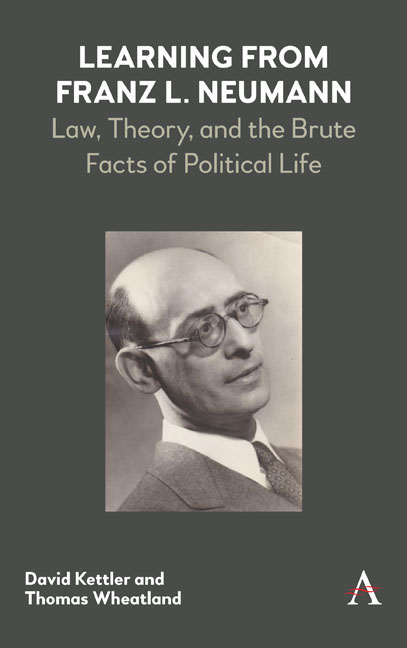Book contents
- Frontmatter
- Contents
- Chapter 1 The Challenge of Franz L. Neumann
- Chapter 2 Social Constitution, Social Power and Responsibility: Neumann and Labor Advocacy
- Chapter 3 Power, Resistance and Constitutions
- Chapter 4 Franz Neumann's Commemoration of Exile
- Chapter 5 After Weimar: The First Exile
- Chapter 6 Neumann's Second Exile: Negotiating the Politics of Research
- Chapter 7 No Happy End: Unprofitable Negotiations
- Chapter 8 Behemoth: Wars Can Be Lost
- Chapter 9 Franz Neumann in Washington: The Political Intellectual at War
- Chapter 10 Franz Neumann in the University: La guerre est finie
- Chapter 11 The Legacy: Four Studies
- Conclusion
- Index
Chapter 8 - Behemoth: Wars Can Be Lost
Published online by Cambridge University Press: 06 September 2019
- Frontmatter
- Contents
- Chapter 1 The Challenge of Franz L. Neumann
- Chapter 2 Social Constitution, Social Power and Responsibility: Neumann and Labor Advocacy
- Chapter 3 Power, Resistance and Constitutions
- Chapter 4 Franz Neumann's Commemoration of Exile
- Chapter 5 After Weimar: The First Exile
- Chapter 6 Neumann's Second Exile: Negotiating the Politics of Research
- Chapter 7 No Happy End: Unprofitable Negotiations
- Chapter 8 Behemoth: Wars Can Be Lost
- Chapter 9 Franz Neumann in Washington: The Political Intellectual at War
- Chapter 10 Franz Neumann in the University: La guerre est finie
- Chapter 11 The Legacy: Four Studies
- Conclusion
- Index
Summary
Leviathan and Behemoth
Franz Neumann was probably the only member of the Institute for Social Research in New York who had been an active partisan of the defeated political forces that shaped the Weimar Republic and who sought to uphold it to the end. Unlike the others, thus, he did not have the luxury of portraying the rise of Hitler as strictly a function of social and cultural forces that he had always resisted. His angry critique in exile of labor's Weimar policies almost always entailed— more or less openly— self- criticism as well. As we have seen, this was at times quite explicit, as when speaking in the name of Leopold Franz, he denounced Franz Neumann's illusions about the state. But that was done in a context in which the reader was left free to believe that the writer thought that a comprehensive socialist revolution had been an alternative available in 1918. When Neumann goes to Hobbes for the ultimate disjunction between “Leviathan” and “Behemoth,” however, he is gauging a more elemental loss and, perhaps, a more shameful defeat. After all, the disaster epitomized for Hobbes by the ouster and execution of Charles I had to do with the loss of the sovereign state whose necessity and feasibility Hobbes had shown in Leviathan, and the prime causes, as set forth in his Behemoth, had all to do with the confusion brought about by the schemes and claims of reformers, political as well as religious.
Hobbes played a number of different roles in Neumann's earlier work, including a striking claim in his LSE dissertation: “Our fundamental thesis, that the introduction of the postulate of the rule of material law and of a rational and secular justification of the state necessarily leads to revolutionary consequences, can be demonstrated in Hobbes's system very clearly” (100). But that is clearly not what Neumann wants to convey with the juxtaposition of the two paradigms that he takes from Hobbes's best- known books. With Rousseau and Hegel— and Montesquieu as a later addition— Hobbes provides Neumann with the constituents of a rational theory of the state, with his own unfinished constructive work dedicated to working out the gaps and conflicts among them. Marx hovers authoritatively in the background, much of the time, but he needs to be complemented by a political theory.
- Type
- Chapter
- Information
- Learning from Franz L. NeumannLaw, Theory, and the Brute Facts of Political Life, pp. 249 - 328Publisher: Anthem PressPrint publication year: 2019



